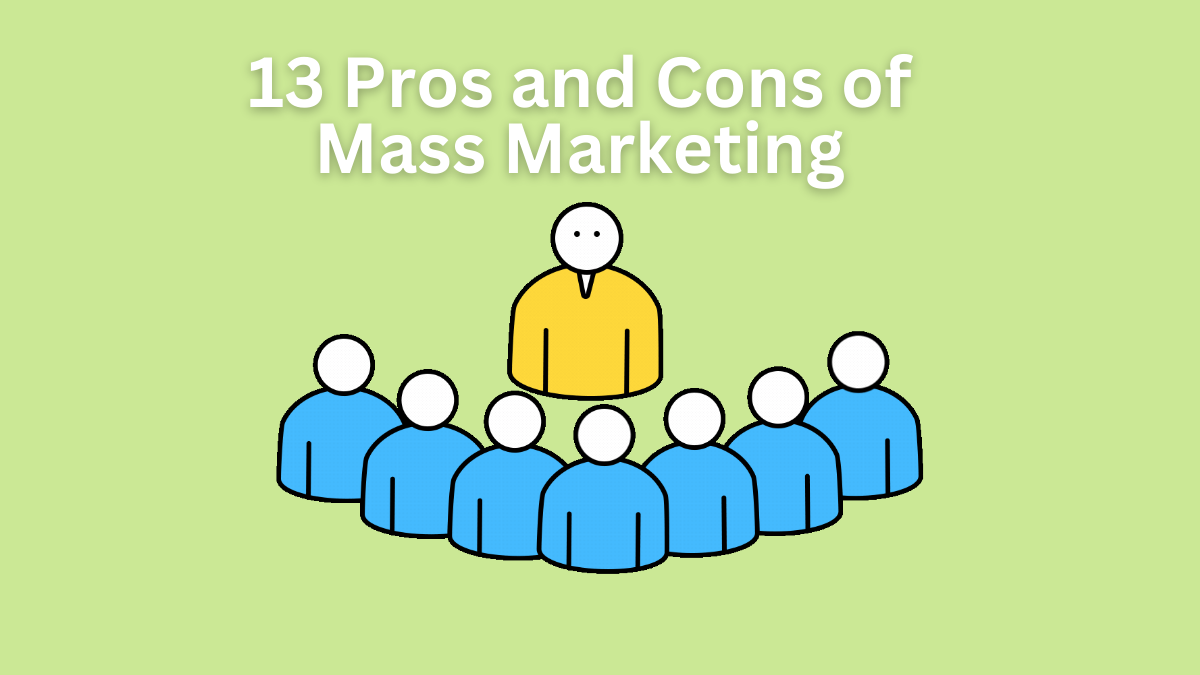Pros and Cons of Mass Marketing
Mass marketing is a marketing strategy in which companies target all groups of consumers through a single campaign. In this article, we will discuss the key pros and cons of mass marketing to businesses.
Pros of Mass Marketing
Mass marketing also called undifferentiated marketing offers various benefits to businesses. Some include the following:
Wider Audience Reach
Think of mass marketing as a massive megaphone in a bustling city center. It allows you to address a multitude of people simultaneously. Picture having to visit each home individually to introduce your product – it would be an endless task!
It leverages platforms like TV, radio, and the internet to ensure your message resounds with millions of individuals. This approach enables you to engage with a diverse array of people hailing from various locations and backgrounds.
Lower Costs
Think of your marketing budget as a bag of marbles. With mass marketing, you can use the same marble to play the game many times. This means you don’t have to spend lots of marbles on different games (campaigns). Instead, you create one campaign and use it across different platforms like TV, social media, and newspapers. It’s like getting a lot of mileage out of a single investment.
Read More: Market Segmentation
Increased Brand Recognition
Imagine your brand as a friendly face in a big crowd. Mass marketing makes sure that a friendly face is seen by lots of people. When your brand message appears everywhere, it sticks in people’s minds. This recognition can make your brand stand out in a sea of competitors.
Cost-Effective Awareness Building
Picture your brand awareness as a garden. Mass marketing is like using a sprinkler to water the entire garden at once. You don’t have to water each plant individually. This saves you time and resources while still helping your brand grow in people’s minds.
Efficient for Building Awareness
Imagine you’re trying to light up a huge stadium. Mass marketing is like turning on powerful floodlights. It quickly illuminates the whole place, making sure everyone sees what you have to offer. This efficiency is perfect for building awareness among a wide audience.
Read More: Levels of Market Segmentation
Economies of Scale
Think of making pizzas. If you make a lot of pizzas, you can buy ingredients in bulk, which makes each pizza cheaper to make. Mass marketing works similarly. When you reach a large audience, the cost per person goes down. This lets you offer your products at competitive prices.
Higher Sales Volume
Imagine you own a lemonade stand. With mass marketing, it’s like setting up your stand in the middle of a busy park. Since everyone passing by can see your stand, you’re likely to sell a lot more lemonade. Mass marketing targets the entire market population, so you can enjoy higher sales.
Variety in Marketing Channels
Mass marketing gives you a toolbox with different tools. You can use TV, radio, social media, and more to get your message out there. It’s like having various musical instruments in a band – each one adds a different sound to your marketing tune. This variety ensures that your message resonates with a diverse audience, increasing your chances of winning new customers.
Read More: 15 Examples of Market Segmentation
Cons of Mass Marketing
While there are several advantages of mass marketing – it also has some drawbacks. Some notable disadvantages of mass marketing include the following:
Lack of Personalization
Mass marketing treats all consumers the same way. It’s like offering everyone the same meal at a restaurant, even if they have different tastes and dietary preferences. This can lead to reduced customer engagement because the message isn’t tailored to individual needs and desires.
Potential for Oversaturation
It can bombard consumers with excessive information and advertisements. It’s similar to being surrounded by billboards on a highway; after a while, people may start to tune out or become overwhelmed. This oversaturation can diminish the effectiveness of marketing campaigns.
Read More: 5 Requirements for Market Segmentation
Lower Profit Margins
It often relies on offering products at lower prices to attract a larger audience. This strategy can lead to thinner profit margins because the emphasis is on high sales volume rather than premium pricing. Consequently, companies may need to sell a significant quantity of products to achieve profitability.
High Competition
This marketing strategy attracts many competitors since it targets a wide audience. It’s like participating in a crowded race with numerous contenders. Companies may find it challenging to stand out and gain a competitive edge in such a crowded marketplace.
Limited Engagement
Mass marketing campaigns may fail to engage customers effectively. It’s similar to providing a one-size-fits-all solution, which might not satisfy everyone’s needs. This lack of engagement can result in reduced customer loyalty and satisfaction.
Read Next: 8 Pros and 5 Cons of Market Segmentation
Arti Kushmi holds a BBS (Bachelor in Business Studies) degree and shares her business and marketing knowledge through this website. While not writing she will be reading and enjoying the moment.
